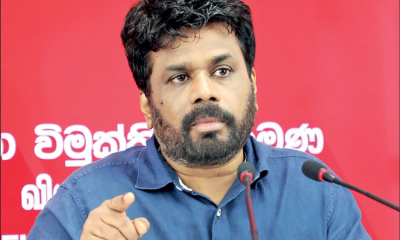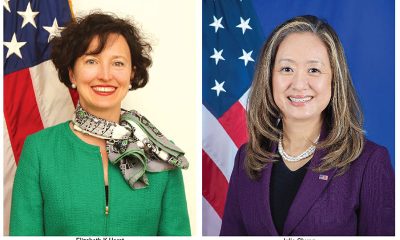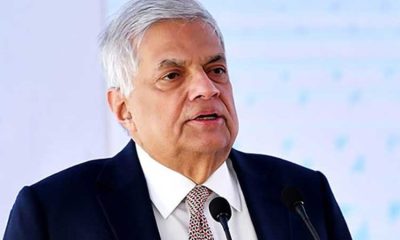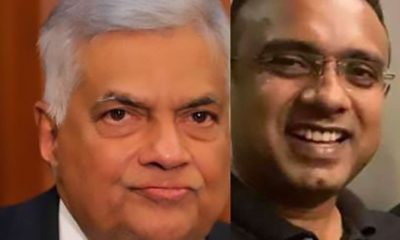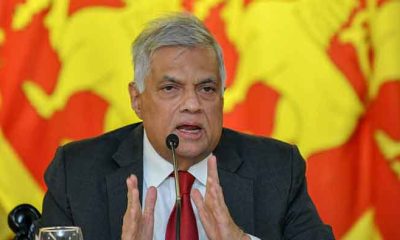Midweek Review
All praise for Lanka’s saviours!
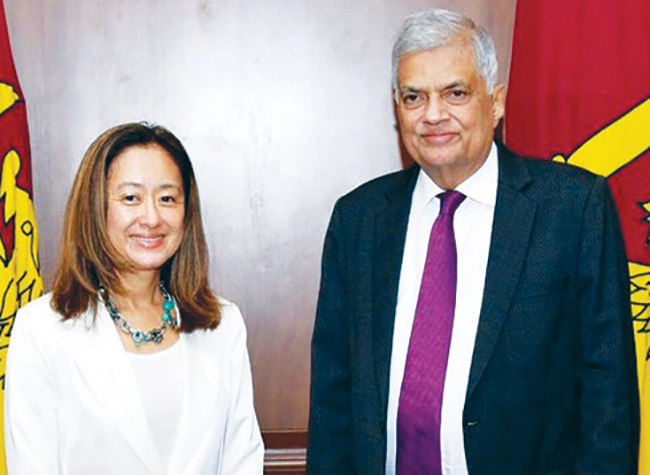
By Shamindra Ferdinando
President Ranil Wickremesinghe, who is also the Finance Minister, recently named three persons – all women -whose intervention supposedly brought relief to bankrupt Sri Lanka.
UNP leader Wickremesinghe paid glowing tributes to Indian Finance and Corporate Affairs Minister Nirmala Sitharaman, US Secretary of State Janet Yellen, and IMF Managing Director and Chairman of the Executive Board Kristalina Ivanova Georgieva-Kinova. The IMF Chief is Bulgarian.
Wickremesinghe declared that Sri Lanka would have experienced extreme difficulties if Sitharaman, Yellen and Georgieva-Kinova had not thrown their weight behind Sri Lanka.
The President said so at an event held at the Waters Edge Hotel, Battramulla, on March 08 to mark International Women’s Day.
It would be pertinent to mention that Sitharaman, Yellen and Georgieva-Kinova are all economists. The Indian Minister, and the IMF Chief, received top posts, in 2019, before the economic crisis gripped Sri Lanka, whereas Yellen was sworn in as US Treasury Chief, on January 26, 2021. Yellen is the first person, in American history, to have led the White House Council of Economic Advisors, the Federal Reserve, and the Treasury Department.
Wickremesinghe attended the event, on the invitation of actress turned lawmaker Geetha Kumarasinghe, Minister of Women and Child Affairs. Kumarasinghe successfully contested the Galle District, at the last parliamentary elections, on the SLPP ticket, after she was previously ousted from Parliament on the basis that she was a dual citizen. Kumarasinghe thereafter gave up her foreign citizenship, which she had obtained when she was married to a foreigner.
Wickremesinghe declared that Sitharaman loaned Sri Lanka USD 3 bn in spite of Colombo being declared bankrupt. in April 2022. Wickremesinghe described Sitharaman’s response to the Sri Lanka crisis as very brave. The UNP leader said that there was a need for him to explain the situation on the ground because if India didn’t make available USD 3 bn, within three to four months, our country would have simply collapsed.
US Ambassador, in Colombo, Julie J. Chung, whose interventions in not so ‘mysterious ways’ in support of a high profile protest campaign, that led to President Gotabaya Rajapaksa’s ouster, on July 14, 2022, was among the guests. Wickremesinghe succeeded Premier Mahinda Rajapaksa on May 12, three days after the latter resigned. Wickremesinghe received appointment as the Minister of Finance, Economic Stability and National Policies, on May 25. We will give the benefit of any doubt we now have about New Delhi being aware of the not so mysterious interventions here, by Washington, as we are almost certain that mandarins in New Delhi would be naturally aware how gleefully the West is looking forward to a bust up between China and India as it would be like disposing two their certain successors in the world
The US support for Sri Lanka, at the IMF, seems natural against the backdrop of the Central Intelligence Agency (CIA) Director William Joseph Burns’s recent clandestine visit to Colombo, in the dead of night. The US group flew in two C 17 Globemasters iii, on February 14, around 7-7.45 pm, and departed on the following day, around 3-3.40 pm. But the country is still in the dark as to what was unloaded from those two giant flying Trojan Horses, just as much as the human cargo. Beware when Americans bear gift horses!
The continuing foreign exchange crisis is broadly attributed to flawed policies, such as tax cuts, debt monetization, banning fertiliser and agrochemical imports, real appreciation of the exchange rate, etc. However, the issues at hand can be also characterized as a liquidity trap in the foreign exchange market, enforced by the economic structure and exploitative market structure, in the import and export sector of the economy, in the long run.
Wickremesinghe’s references to Sitharaman, Yellen and Georgieva-Kinova should be examined, taking into consideration early Indian and US support for the USD 2.9 bn IMF bailout package for Sri Lanka. All stakeholders made such a noise, over the IMF facility spread over a period of four years, that some ordinary people may have felt the country was down on its knees, before the Washington-based lender, for the first time.
In fact, we have secured IMF packages on 16 previous occasions and could have avoided the crisis if President Gotabaya Rajapaksa took the warning signs seriously and the plotters, surrounding him, had not overwhelmed him with the help of outside evil forces. Unfortunately, the wartime Defence Secretary, who handsomely won the November 2019 presidential election, allowed the deterioration. The sharp drop in tourist arrivals, in the wake of the April 2019 Easter Sunday attacks, and the overall shrinking of the global economy, due to the Covid-19 pandemic, made matters worse for Sri Lanka.
What may have sealed his fate must have been how those conveniently called peaceful protesters, by the likes of Julie Chung, and local NGO quislings, etc., went on the rampage across the country, with meticulous intelligence, from the evening of last May 09, targeting Opposition politicians and their supporters. In fact that afternoon/evening, the US Ambassador even issued a media release, literally ordering the armed forces and the police not to touch those “peaceful protestors”. How convenient?
This also brings us to the question whether our comrades, too, had done a deal with the real devils in Washington. Can anyone imagine how these comrades, who literally burnt down the country, in the wake of the JRJ government, under military pressure from Delhi, signed the Indo-Lanka Accord that brought in the controversial 13th Amendment, are now pretending to be innocent babes and got their proxy Harini to say it is alright to fully implement that piece of legislation, almost in unison with Ranil Wickremesinghe!
And who could have furnished so many foot soldiers to cause so much spontaneous havoc across the country and, especially, against government politicians, many of whom have still not recovered? We do accept the fact that like all politicians in general they were no angels, either, but they had come up playing the available corrupt system through legitimate elections.
Dr. Indrajit Coomaraswamy, one-time Governor of the Central Bank of Sri Lanka (July 2016-Dec 2019), blamed the current crisis on the failure on the part of successive governments to manage the expenditure since the country gained Independence. Sri Lanka had been plagued by a toxic combination of populist politics and an entrenched entitlement culture among the people, Dr. Coomaraswamy told the writer, in response to a query posed during Gotabaya Rajapaksa’s presidency. Dr. Coomaraswamy added: “Time and again, the electoral calendar has undermined fiscal discipline.”
However, according to critics Dr. Coomaraswamy only told one side of the truth. What he didn’t say was that as the CB Governor, he was also directly responsible for the Yahapalana government borrowing a record USD 12.5 billion from the international bond market, at high interest rates, from private lenders, primarily in the West. So what did that government achieve with such huge borrowings? All that the Yahapalana regime achieved, with all that money, we cannot see, except to lay the foundation for the current debt crisis?
Central Bank Governor, Dr. Nandalal Weerasinghe, too, delivered a lecture, to the members of Parliament, on the same lines. Dr. Weerasinghe launched a no holds barred attack on the irresponsible political party system, several weeks after Wickremesinghe succeeded Gotabaya Rajapaksa.
Pointing out that measures that had been taken by the Yahapalana government (2016-2019), following an agreement with the IMF, were disregarded by those who regained power, in 2019/2020, Dr. Weerasinghe said if the government/Opposition reneged on the latest arrangements, the country would face a similar crisis, in three years. Dr. Weerasinghe issued the warning on August 31, 2022, in the presence of Speaker Mahinda Yapa Abeywardena.
A fraudulent partnership
 President Wickremesinghe has now appreciated the role played by three economists in Sri Lanka’s economic recovery. The President should also take tangible measures to investigate political parties, and individuals, responsible for the economic meltdown.
President Wickremesinghe has now appreciated the role played by three economists in Sri Lanka’s economic recovery. The President should also take tangible measures to investigate political parties, and individuals, responsible for the economic meltdown.
A group, representing trade union and civil society, collective, recently raised quite an important issue that had been largely ignored by successive governments, over the past decades. They called for tangible measures to tackle the well-organized influential public–private sector partnership engaged in ‘over invoicing’ and ‘under invoicing’ of imports/exports, with the blessing of successive governments.
Their invitation for a discussion with the print and electronic media didn’t attract sufficient attention. The briefing, and discussion, at the Centre for Society and Religion, Maradana, Colombo, attracted just a few journalists. However, economic analyst Dhanusha Pathirana, civil society activist Tharindu Uduwaragedara and Attorney-at-Law Lakmali Hemachandra explained how ‘over invoicing’ and ‘under invoicing’ contributed to the economic crisis.
They didn’t mince their words when they discussed the ongoing high profile operation that involved both the private and the public sector.
Pathirana asserted that a sharp reduction of capital, as a result of mispricing by importers, in respect of duty/tax free goods and taxable imports, was far more serious than the parking of funds overseas by exporters.
The group underscored the need to examine capital flows, through four forms of trade mis-invoicing, namely import over-invoicing and under-invoicing and export over-invoicing and under-invoicing.
Responding to queries raised by the writer, they alleged that regulatory mechanisms were not being implemented, regardless of the continuing economic decline. The failure on the part of the government to act on such disclosures is really disturbing. The country is in such a precarious state, those having regulatory powers should go flat out against the culprits, unless they were part of the fraudulent capitals flows.
Pathirana was adamant that absolutely nothing had been done so far to address the issue at hand.
Culpability of Cabinet
The Parliament continues to ignore extremely serious disclosures, pertaining to economic mismanagement. Shocking revelations that had been made before the Committee on Public Enterprises (COPE) in late May, last year ,hadn’t been investigated at all. Instead, the Wickremesinghe-Rajapaksa government has sought to manipulate the parliamentary watchdog, much to the dismay of the public. In fact, the powers that be had no qualms in interfering in all three watchdog committees, especially the Committee on Public Finance.
The COPE, during the courageous leadership of Prof. Charitha Herath was told how the then Prime Minister Mahinda Rajapaksa, who also served as the Finance Minister, in spite of receiving warnings in March-April 2020, on the impending financial crisis of unprecedented magnitude, chose to ignore the advice.
Mahinda Rajapaksa held the Finance portfolio till early July 2021. By the time Basil Rajapaksa succeeded, the economy had suffered irreparable damage.
The parliamentary watchdog was told how the International Monetary Fund (IMF) had warned the then Governor of the Central Bank, Prof. W. D. Lakshman, and Treasury Secretary S.R. Attygalle, of the country’s inability to procure loans, unless the country undertook debt restructuring, immediately.
The COPE members received a briefing, on the circumstances leading to the crisis, when senior officials of the Central Bank appeared before the all-party body. CBSL Governor Dr. Weerasinghe declared that the IMF warning hadn’t been heeded at all.
The COPE received confirmation of what has been widely speculated, hours after Wickremesinghe was sworn in as the new Finance Minister.
Janakantha Silva, Director Legislative Services/Director Communication, Parliament, quoted Dr. Weerasinghe as having told COPE that following technical talks held in terms of the Finance Act, pertaining to the IMF’s stand, recommendations were made to the then Premier and other senior officials. Dr. Weerasinghe has stated that the relevant decisions should have been made by the Premier, in his capacity as the Finance Minister and the entire Cabinet of Ministers.
The IMF has made its position clear after having asserted Sri Lanka lacked debt sustainability.
Asserting the failure on the part of those who managed the economy for causing a massive crisis, Prof. Charitha Herath called it a crime. The first time entrant to Parliament recommended the setting up of a Special Parliamentary Select Committee to probe those who neglected their responsibilities, thereby causing the current debilitating crisis. Prof. Herath blamed those few who managed the economy during that period.
But, absolutely nothing has been done. The disclosures before COPE had been quite conveniently forgotten.
SLPP National List MP Basil Rajapaksa succeeded Mahinda Rajapaksa, in July 2021, as the Finance Minister, whereas President Gotabaya Rajapaksa brought in SLPP National List MP Ajith Nivard Cabraal as the Governor of the Central Bank, in Sept 2021. Cabraal quit in March, 2022 to pave the way for Dr. Weerasinghe, the former Bank Deputy Governor, to return from retirement in Australia, as its new Governor.
Dr. Harsha de Silva has repeatedly pointed out how the then Finance Minister Mahinda Rajapaksa delegated his responsibilities to the then State Finance Minister Cabraal, who refrained from briefing the Parliament as regards the actual situation. Dr. de Silva is on record as having said that the IMF’s declaration of debt sustainability should be examined against the backdrop of the revenue cut imposed on the recommendation of the then Secretary to the President and one time Central Banker and Treasury Secretary Dr. P.B. Jayasundera that deprived the Treasury of Rs 600 mn in taxes.
Dr. de Silva asked who decided on the tax cut in spite of the IMF specifically advising the government not to do so. The top SJB spokesperson has asked who decided on such a reckless course of action.
When the COPE raised a contentious issue of the Central Bank wasting precious funds to prevent depreciation of the Sri Lanka Rupee, Dr. Weerasinghe said this was the responsibility of the Monetary Board, comprising five persons. The then Monetary Board member Dr. Ranee Jayamaha has revealed that the then Governor Prof. W.D. Lakshman, Treasury Secretary S.R. Attygalle, and nominated member Samantha Kumarasinghe, decided on that course of action in spite of her and Sanjiva Jayawardena, PC, opposing them. They had registered their protest in writing.
However, can Dr. Jayamaha and President’s Counsel Jayawardena absolve themselves of the responsibility? They remain members of the Monetary Board.
The proposed Special Parliamentary Select Committee should have also summoned Dr. P.B. Jayasundera, deposed President’s Secretary. But, the Yahapalana decision to repeal the time-tested Exchange Control Act No 24 of 1953 remains a mystery. A section of the Opposition alleges enactment of Foreign Exchange Act, No. 12 of 2017, during Wickremesinghe tenure as the Prime Minister, facilitated ‘parking’ of export proceeds, overseas, to the tune of billions of USD. Justice Minister Dr. Wijeyadasa Rajapakse, PC, is on record as having said that well over USD 50 bn had been stashed overseas. But what has he done to convince the Cabinet-of-Ministers to restore the repealed Act.
Former State Minister Jayantha Samaraweera (National Freedom Front) recently told this writer that Basil Rajapaksa, in his capacity as the Finance Minister, rejected their leader Wimal Weerawansa’s proposal to restore the old Act.
The Yahapalana government passed the new Act on July 25, 2017. The Samagi Jana Balavegaya (SJB), as well as the SLFP, voted for the new Act. Altogether 94 voted for the new Law, whereas 18 voted against. Then Speaker Karu Jayasuriya certified the new Act.
Contrary to reports, the new Act was brought in during the late Mangala Samaraweera’s tenure as the Finance Minister. Samaraweea succeeded Finance Minister Ravi Karunanayake, on May 22, 2017.
Another matter that needed attention is Sri Lanka’s International Sovereign Bonds (ISBs) as of USD 15.5, USD 12.5 had been obtained during the Yahapalana administration (2015-2019) or, in other words, in Wickremesinghe’s tenure as the Prime Minister.
In late January, 2022, the then Governor Ajith Nivard Cabraal told US-based CNBC that Sri Lanka had to pay USD 12.5 bn of debt in ISBs’ over the next seven years. Cabraal resigned three months later.
The country is in a catch-22 situation. Caught up in US Indo-Pacific strategy, the political leadership here is struggling to avoid the scheduled Local Government polls for obvious reasons. Contrary to the US call for holding of LG polls, the superpower perhaps may facilitate their overall strategy. A certain defeat at the mini-polls is sure to weaken Wickremesinghe’s hold, hence the decision to sabotage the polls. Regardless of the Opposition efforts to galvanize public protests to pressure the government over the LG polls, the incumbent administration seems confident a gradual turnaround of the economy may facilitate its efforts to keep the situation under control, for the time being.
Midweek Review
AKD’s Jaffna visit sparks controversy
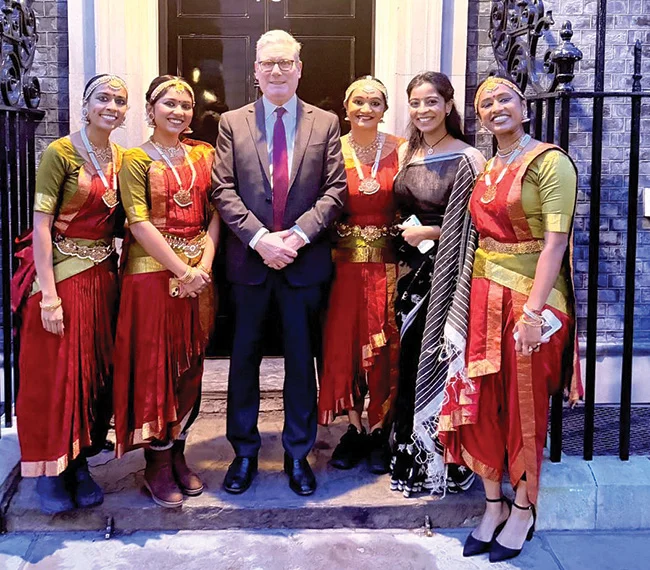
President Anura Kumara Dissanayake’s (AKD) recent visit to Jaffna received significant social media attention due to posting of a less than a minute-long video of him going for a walk there.
An unarmed soldier was captured walking beside AKD who is also the Commander-in-Chief of the armed forces in addition to being the Defence Minister. A soldier carrying an assault rifle was seen walking behind AKD. There was another soldier in a pair of shorts walking just behind the President. AKD’s Personal Security Officer (PSO) was not on that video. By January 26th morning that video received 378 K ‘hits’ and 9.8 K reactions.
AKD was in a pair of shorts and running shoes. There hadn’t been a previous occasion in which AKD was captured in a pair of shorts during his time as a lawmaker or the President. AKD was there on a two-day visit that coincided with Thai Pongal.
AKD’s latest visit to Jaffna for Thai Pongal caused a huge controversy when he declared that those who visited Buddhist shrines there influenced and encouraged hate. “Coming to Jaffna to observe sil on a Poya Day, while passing the Sri Maha Bodhi, is not virtue, but hatred,” AKD declared. The utterly uncalled for declaration received the wrath of the Buddhists. What made AKD, the leader of the JVP, a generally avowed agnostics, as well as NPP, to make such an unsubstantiated statement?
Opposition political parties did not waste much time to exploit AKD’s Jaffna visit to their advantage. They accused AKD of betraying the majority Buddhists in the country. Those who peruse social media know how much AKD’s Jaffna talk angered the vast majority of people aware of the sacrifices made by the armed forces and police to eradicate terrorism.
If not for the armed forces triumph over the LTTE in May 2009, AKD would never have ended up in the Office of the President. That is the undeniable truth. Whatever, various interested parties say, the vast majority of people remember the huge battlefield sacrifices made by the country’s armed forces that made the destruction of the LTTE’s conventional military power possible. Although some speculated that the LTTE may retain the capability to conduct hit and run attacks, years after the loss of its conventional capacity, the group couldn’t stage a comeback, thanks to eternal vigilance and the severity of its defeat.
AKD’s attention-grabbing Jaffna walk is nothing but a timely reminder that separatist Tamil terrorism had been defeated, conclusively. Of course, various interested parties may still propagate separatist views and propaganda but Eelam wouldn’t be a reality unless the government – whichever political party is in power – created an environment conducive for such an eventuality.
The JVP/NPP handsomely won both the presidential and parliamentary polls in Sept. and Nov. 2024, respectively. Their unprecedented triumph in the Northern and Eastern provinces emboldened their top leadership to further consolidate their position therein at any cost. However, an unexpected and strong comeback made by one-time LTTE ally, the TNA, appeared to have unnerved the ruling party. On the other hand, the TNA, too, seems to be alarmed over AKD’s political strategy meant to consolidate and enhance his political power in the North.
Perhaps, against the backdrop of AKD’s Jaffna walk, we should recollect the capture of Jaffna, the heart of the separatist campaign during President Chandrika Bandaranaike Kumaratunga’s time. Jaffna town was regained in the first week of December, 1995, 11 years before the outbreak of Eelam War IV (August 2006 to May 2009).
Operation Riviresa
In the run-up to the January 2015 presidential election, Kumaratunga, who served two terms as President (1994 to 1999 and 2001 to 2005), declared that her administration liberated 75% of the territory held by the LTTE. That claim was made in support of Maithripala Sirisena’s candidature at the then presidential election. Kumaratunga joined hands with the UNP’s Ranil Wickremesinghe, the JVP (NPP was formed in 2019), the SLMC and the TNA to ensure Sirisena’s victory.
Liberating 75% of territory held by the LTTE was nothing but a blatant lie. That claim was meant to dispute war-winning President Mahinda Rajapaksa’s bid for a third term. Ahead of the 2005 presidential election, Kumaratunga’s administration lost the capacity to conduct large-scale ground offensives in the Northern theatre of operations. In fact, the last major offensive, codenamed Agni Kheelsa in April 2001, had been undertaken in the Jaffna peninsula where the Army suffered debilitating losses, both in men and material. That was President Kumaratunga’s last attempt to flex military muscle. But, she should be credited for whole-heartedly supporting Operation Riviresa (Aug. to Dec. 1995) that brought back Jaffna under government control.
In spite of several major attempts by the LTTE to drive the Army out of Jaffna, the military held on. The largest ever combined security forces offensive, under President Mahinda Rajapaksa, with the Navy and Air Force initiating strategic action against the LTTE and the triumph over separatist terrorism in two months short of three years, should be examined taking into consideration the liberation of the Jaffna peninsula and the islands.
If President Kumaratunga failed to bring Jaffna under government control in 1995 and sustain the military presence there, regardless of enormous challenges, the war wouldn’t have lasted till 2006 and the outcome of the war could have gone the other way much earlier. Whatever the criticism of Kumaratunga’s rule, liberating the Jaffna peninsula is her greatest achievement. Regardless of financial constraints, Kumaratunga and her clever and intrepid Treasury Secretary, the late A.S. Jayawardena, provided the wherewithal for the armed forces to go on the offensive. After the successful capture of Jaffna, by the end of 1995, Kumaratunga ordered Kfirs and MiG 27s, and a range of other weapons, including Multi Barrel Rocket Launchers (MBRLs), to enhance the fire power, but the military couldn’t achieve the desired results. While she provided any amount of jaw, jaw, it was Amarananda Somasiri Jayawardena who ensured that the armed forces were provided with the necessary wherewithal, under difficult circumstances, especially in the aftermath of the later humiliating Wanni debacle, when he was the Central Bank Governor.
AKD is certainly privileged to engage in morning exercises in a terrain where some of the fiercest battles of the Eelam conflict were fought, involving the Indian Army, as well as other Tamil groups, sponsored by New Delhi, in the ’80s.
When the Army secured Jaffna, in 1995, and lost Elephant Pass in 2000, the forward defence lines had to be re-established and defended at great cost to both men and material. By then, the Vanni had become the LTTE stronghold and successful ground offensive seemed impossible but under President Mahinda Rajapaksa’s political leadership the combined armed forces achieved the unthinkable – the annihilation of the LTTE in a way it couldn’t make a comeback at any level. AKD’s post that went viral recently is evidence that peace has been restored and maintained for the Commander-in-Chief to take a walk on a Jaffna street.
Social media comments on AKD’s Jaffna walk reflected public thinking, especially against the backdrop of that unwarranted claim regarding Buddhists influencing hatred by visiting Jaffna on a Poya Day to observe sil, having passed the Sri Maha Bodhi.
UK anti-SL campaign
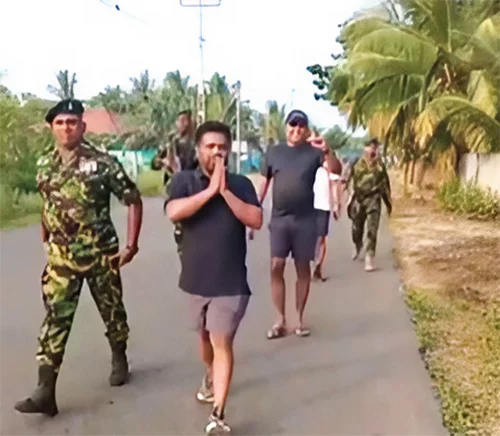
President Dissanayake taking a walk
It would be pertinent to ask the Sri Lanka High Commission in the UK regarding action taken to counter the continuing propaganda campaign against the country. Sri Lankan HC in the UK Nimal Senadheera owed an explanation as UK politicians seemed to be engaged in a stepped-up Sri Lanka bashing with the NPP government not making any effort to counter such propaganda against our country.
Interestingly, the UK government is on a collision course with no less a person than President Donald Trump over his recent humiliating comments on NATO troops who fought alongside the Americans in Afghanistan.
British Prime Minister Keir Starmer is on record as having said that President Trump’s comments were “insulting and frankly appalling.” Starmer suggested the US President apologise for his remarks. Amidst strong protests by humiliated NATO countries, President Trump retracted his derogatory comments.
But the UK’s position with regard to Tamil terrorism that also claimed the lives of nearly 1,500 Indian officers and men seemed different. The UK continues to ignore crimes perpetrated by the LTTE, including rival Tamil groups, political parties and Tamil civilians.
The Labour Party that promoted and encouraged terrorism throughout the war here raised the post-war Sri Lanka situation again.
The Labour Party questioned the British government in the House of Commons recently on what action it was taking to support Tamils seeking justice for past and ongoing abuses in Sri Lanka.
Raising the issue on 20 January 2026, Peter Lamb, the Labour MP for Crawley, asked: “What action is the UK Government taking to support Tamils in seeking justice for past and current injustices?”
Responding on behalf of the government, Hamish Falconer, Parliamentary Under-Secretary of State at the Foreign, Commonwealth and Development Office, said the UK remained actively engaged in accountability for crimes committed against the Tamil people.
“The UK is active in seeking justice and accountability for Sri Lanka’s Tamil community,” Falconer told the House. He said Britain continues to play a leading role at the United Nations Human Rights Council on resolutions addressing Sri Lanka’s human rights record.
Falconer added that the UK had taken concrete steps in recent years, including imposing sanctions. “Last year, we sanctioned Sri Lankans for human rights violations in the civil war,” he said, referring to measures targeting individuals implicated in serious abuses.
He also stated that the UK had communicated its expectations directly to Colombo. “We have made clear to the Sri Lankan Government the importance of improved human rights for all in Sri Lanka, as well as reconciliation,” Falconer said.
Concluding his response, Falconer marked the Tamil harvest festival, adding, “Let me take the opportunity to wish the Tamil community a happy Thai Pongal.”
The UK cannot be unaware that quite a number of ex-terrorists today carry British passports.
David Lammy’s promise
Our High Commissioner in London Nimal Senadheera, in consultation with the Foreign Ministry in Colombo, should take up the Parliamentary Under-Secretary of State at the Foreign, Commonwealth and Development Office Hamish Falconer’s comment on sanctions imposed on Sri Lankans in March 2025. Falconer was referring to General (retd.) Shavendra Silva, Admiral of the Fleet Wasantha Karannagoda, General (retd), Jagath Jayasuriya and one-time LTTE commander Vinayagamoorthy Muralitharan, aka Karuna Amman.
The then Secretary of State for Foreign, Commonwealth and Development Affairs, David Lammy, declared in March 2025 that the above-mentioned Sri Lankans were sanctioned in line with election promises. A UK government statement quoted Lammy as having said: “I made a commitment during the election campaign to ensure those responsible are not allowed impunity. This decision ensures that those responsible for past human rights violations and abuses are held accountable.”
Since then David Lammy has received the appointment as Lord Chancellor, Secretary of State for Justice and Deputy Prime Minister.
Recent Thai Pongal celebrations held at 10 Downing Street for the second consecutive year, too, was used to disparage Sri Lanka with reference to genocide and Tamils fleeing the country. They have conveniently forgotten the origins of terrorism in Sri Lanka and how the UK, throughout the murderous campaign, backed terrorism by giving refuge to terrorists.
The British had no qualms in granting citizenship to Anton Balasingham, one-time translator at the British HC in Colombo and one of those who had direct access to LTTE leader Velupillai Prabhakaran. Balasingham’s second wife, Australian-born Adele, too, promoted terrorism and, after her husband’s demise in Dec 2006, she lives comfortably in the UK.
Adele had been captured in LTTE fatigues with LTTE women cadres. The possibility of her knowing the LTTE suicide attack on former Indian Prime Minister Rajiv Gandhi in May 1991 can never be ruled out.
With the British PM accommodating those campaigning against Sri Lanka at 10 Downing Street and the Deputy PM openly playing politics with the issues at hand, Sri Lanka is definitely on a difficult wicket.
Sri Lanka has chosen to appease all at the expense of the war-winning military. The NPP government never made a genuine effort to convince Britain to rescind sanctions imposed on three senior ex-military officers and Karuna. The British found fault with Karuna because he switched allegiance to the Sri Lankan military in 2004. The former eastern commander’s unexpected move weakened the LTTE, not only in the eastern theatre of operations but in Vanni as well. Therefore, the British in a bid to placate voters of Sri Lankan origin, sanctioned Karuna while accommodating Adele whose murderous relationship with the LTTE is known both in and outside the UK Parliament.
Some British lawmakers, in a shameless and disgraceful manner, propagated lies in the UK Parliament for obvious reasons. Successive governments failed to counter British propaganda over the years but such despicable efforts, on behalf of the LTTE, largely went unanswered. Our governments lacked the political will to defend the war-winning armed forces. Instead, the treacherous UNP and the SLFP got together, in 2015, to back a US-led accountability resolution that sought to haul Sri Lanka up before the Geneva-based United Nations Human Rights Council (UNHRC).
The possibility of those who propagated lies receiving monetary benefits from interested parties cannot be ruled out. Sri Lanka never bothered to counter unsubstantiated allegations. Sri Lanka actually facilitated such contemptible projects by turning a blind eye to what was going on.
The Canadian Parliament declaration that Sri Lanka perpetrated genocide during the conflict didn’t surprise anyone. The 2022 May announcement underscored Sri Lanka’s pathetic failure on the ‘human rights’ front. The Gotabaya Rajapaksa government struggling to cope with the massive protest campaign (Aragalaya) never really addressed that issue. Ranil Wickremesinghe, who succeeded Gotabaya Rajapaksa in July 2022, too, failed to take it up with Canada. The NPP obviously has no interest in fighting back western lies.
The Canada Parliament is the first national body to condemn Sri Lanka over genocide. It wouldn’t be the only parliament to take such a drastic step unless Sri Lanka, at least now, makes a genuine effort to set the record straight. Political parties, representing our Parliament, never reached a consensus regarding the need to defeat terrorism in the North or in the South. Of those elected representatives backed terrorism in the North as well as terroirism in the South. Perhaps, they have collectively forgotten the JVP terrorism that targeted President JRJ and the entire UNP Parliamentary group. The JVP attack on the UNP, in parliament, in August 1987, is a reminder of a period of terror that may not have materialised if not for the Indian intervention.
By Shamindra Ferdinando
Midweek Review
Some heretical thoughts on educational reforms

The term education originates from the Latin words ‘educare’, meaning ‘to bring up’, and educere, meaning ‘to bring forth’. The precise definition of education is disputed. But if it is linked with the obvious expected outcome of it – learning, then the definition of education changes to a resultant outcome of ‘a change in behaviour’.
Let me say this at the outset. I am not going to get embroiled in the nitty-gritty pros and cons of the current controversies hogging the headlines today. Except to say this. As every discerning and informed person says, we need educational reforms. There is near unanimity on that. It is the process – a long, and even tedious process – that needs to be carried out that gives rise to disagreements and controversy. A public discussion, stakeholder viewpoints and expert opinion should be given due time and consideration.
Sex education – “the birds and bees” to start with – has to be gradually introduced into school curricular. When? is the critical question that needs specific answers. Do we need to go by Western standards and practices or by a deep understanding of our cultural milieu and civilisational norms? One thing is clear in my mind. Introduction of sex education into school curricular must not be used – or abused – to make it a ‘freeway’ for indiscriminate enforcement of the whole human sexual spectrum before the binary concepts of human sexuality has been clearly understood by children – especially during their pre-pubertal and immediate post-pubertal adolescent years. I have explicitly argued this issue extensively in an academic oration and in an article published in The Island, under the title, “The child is a person”.
Having said that, let me get on to some of my heretical thoughts.
Radical thinkers
Some radical thinkers are of the view that education, particularly collective education in a regulated and organised school system, is systematic streamlined indoctrination rather than fostering critical thinking. These disagreements impact how to identify, measure, and enhance various forms of education. Essentially, what they argue is that education channels children into pliant members of society by instilling existing or dominant socio-cultural values and norms and equipping them with the skills necessary to become ‘productive’ members of that given society. Productive, in the same sense of an efficient factory production line.
This concept was critiqued in detail by one of my favourite thinkers, Ivan Illych. Ivan Illich (1926 – 2002) was an Austrian philosopher known for his radical polemics arguing that the benefits of many modern technologies and social arrangements were illusory and that, still further, such developments undermined humans’ image of self-sufficiency, freedom, and dignity. Mass education and the modern medical establishment were two of his main targets, and he accused both of institutionalising and manipulating basic aspects of life.
One of his books that stormed into the bookshelves that retains particular relevance even today is the monumental heretical thought ‘Deschooling Society’ published in 1971 which became his best-known and most influential book. It was a polemic against what he called the “world-wide cargo cult” of government schooling. Illich articulated his highly radical ideas about schooling and education. Drawing on his historical and philosophical training as well as his years of experience as an educator, he presented schools as places where consumerism and obedience to authority were paramount. Illich had come to observe and experience state education during his time in Puerto Rico, as a form of “structured injustice.”
‘Meaningless credentials’
Ilych said that “genuine learning was replaced by a process of advancement through institutional hierarchies accompanied by the accumulation of largely meaningless credentials”. In place of compulsory mass schooling, Illich suggested, “it would be preferable to adopt a model of learning in which knowledge and skills were transmitted through networks of informal and voluntary relationships”. Talking of ‘meaningless credentials’ it has become the great cash-cow of the education industry the world over today – offering ‘honorary PhDs’ and ‘Dr’ titles almost over the counter. For a fee, of course. I wrote a facebook post titled “Its raining PhDs!”.
Mass education and the modern medical establishment were two of his main targets, and he accused both of institutionalising and manipulating basic aspects of life. I first got to ‘know’ of him through his more radical treatise “Medical Nemesis: The expropriation of Health”, that congealed many a thought that had traversed my mind chaotically without direction. He wrote that “The medical establishment has become a major threat to health. The disabling impact of professional control over medicine has reached the proportions of an iatrogenic epidemic”. But it was too radical a thought, far worse than ‘Deschooling Society’. The critics were many. But that is not our topic for the day.
The other more politically radical views on education comes from Paul Freire. Paul Freire (1921 – 1997) was a Brazilian educator and Marxist philosopher whose work revolutionised global thought on education. He is best known for his 1968 book “Pedagogy of the Oppressed” in which he reimagines teaching as a “collaborative act of liberation rather than transmission”. A founder of critical pedagogy, Freire’s influence spans literary movements, liberation theology, postcolonial education, Marxism, and contemporary theories of social justice and learning. He is widely regarded as one of the most important educational theorists of the twentieth century.
Neutral education process?
Richard Shaull, in his introduction to the 13th edition of ‘Pedagogy of the Oppressed’ wrote: “There is no such thing as a neutral education process. Education either functions as an instrument which is used to facilitate the integration of generations into the logic of the present system and bring about conformity to it, or it becomes the “practice of freedom”, the means by which men and women deal critically with reality and discover how to participate in the transformation of their world”.
Here are a few quotes from Paul Freire before I revert to the topic I began to write on: “Liberating education consists in acts of cognition, not transferals of information.”; he believed that “true liberation comes from the oppressed taking agency and actively participating in the transformation of society”; he viewed “education as a political act for liberation – as the practice of freedom for the oppressed.”; He said that “traditional education is inherently oppressive because it serves the interests of the elite. It helps in the maintenance of the status quo.”
Where does our own ‘educational reforms’ stand? Is it transference, transformative, liberating or an attempt at maintaining the status quo with the help of the ADB? The history of educational reforms in Sri Lanka has been long. A quick check on the internet elicited the following:
Colonial Era (Pre-1940s): Colebrooke-Cameron Commission (1830s): Promoted English and standardised curriculum, laying groundwork for modern systems.
Buddhist Revival: Efforts by Anagarika Dharmapala to establish schools with Buddhist principles and English education.
The Kannangara Reforms (1940s): 1943 – Minister C.W.W. Kannangara introduced free education for all funded by general taxes; 1947 – introduced it from kindergarten to university. Central Schools (Madhya Maha Vidyalayas) established high-quality secondary schools in rural areas to ensure equitable access. Medium of Instruction was mandated to be the national languages (Sinhala and Tamil) for primary education.
Nationalisation and Standardisation
Nationalisation and Standardisation (1960s-1970s): 1961 – Denominational schools were taken over by the government to create a national education system. 1972 – New attempts at reform introduced following the 1971 youth uprising, focusing on democratising education and practical skills through a common curriculum and a national policy, responding to socio-economic needs. Introduction of language-based standardisation that in all likelihood triggered the ‘separatist war’. 1978 – change from language-based standardisation to district-based standardisation on a quota system for university entrance that was first introduced with a promise for only ten years, but persists until today, for nearly 50 years. No government dares to touch it as it is politically explosive.
Focus on quality and access (1980s-1990s): White Paper on Education (1981) – aimed to modernise the system together with components of privatising higher education. It faced severe criticism and public protests for its clear neoliberal leanings. And it never got off the ground. The National Colleges of Education (1986) were established.
1987 – Devolution of education power to provincial councils. 1991 – Establishment of The National Education Commission created to formulate long-term national policies. 1997 – Comprehensive reforms through a Presidential Task Force to overhaul the general education system (Grades 1-13), including early childhood development and special and adult education.
21st Century Reforms (2000s-Present): Mid-1990s-early 2000s – focused on transforming education from rote learning to competency-based, problem-solving skills; emphasising ICT, English, equity, and aligning education with labour market needs; introducing school restructuring (junior/senior schools) and compulsory education for ages 5-14; and aiming for national development through development of human capital.
Modernising education
2019 educational reforms focused on modernising education by shifting towards a modular, credit-based system with career pathways, reducing exam burdens, integrating vocational skills, and making education more equitable, though implementation details and debates around cultural alignment continued. Key changes included introducing soft skills and vocational streams from Grade 9/10; streamlining subjects, and ensuring every child completes 13 years of education; and moving away from an excessive focus on elite schools and competitive examinations.
This government is currently implementing the 2019 reforms in the National Education Policy Framework (2023–2033), which marks a radical departure from traditional methods. Module-Based System and a shift from exam-centric education to a module-based assessment system starting in 2026.
Already we have seen multi-pronged criticisms of these reforms. These mainly hinge on the inclusion – accidentally or intentionally – of a website for adult male friend groups. The CID is investigating whether it was sabotage.
Restricting access to social media
When there is a global concern on the use of smartphones and internet by children, and where Australia has already implemented a new law in December 2025 banning under-16s from major social media platforms to protect children from cyberbullying, grooming, and addiction, requiring tech companies to use age verification.
The U.S. does not have a federal law banning smartphones for under-16s, but a major movement, fuelled by the US Surgeon-General warnings and research on youth mental health, is pushing for restrictions, leading many individual states (like California, Florida, Virginia) to enact laws or guidelines for school-day bans or limits for students, focusing on classroom distraction and social media risks, with some advocates pushing for no smartphones before high school or age 16.
The UK doesn’t currently have a legal ban on smartphones for under-16s, but there’s significant political and public pressure for restrictions, with debates focusing on social media access and potential school bans, with some politicians and experts advocating bans similar to Australia’s, while others push for stronger regulations under the existing Online Safety Act to protect children from addictive algorithms and harm.
Sweden is implementing a nationwide ban on mobile phones in schools for students aged 7 to 16, starting in autumn 2026, requiring devices to be handed in until the school day ends to improve focus, security, and academic performance, as part of a major education reform. This national law, not just a recommendation, aims to reduce distractions and promote traditional learning methods like books and physical activity, addressing concerns about excessive screen time affecting children’s health and development.
Norway doesn’t have a complete smartphone ban for under-16s but is moving to raise the minimum age for social media access to 15 and has implemented strong recommendations, including a ban on phones in schools to protect children from harmful content and digital overexposure, with studies showing positive impacts on focus and well-being. The government aims to shield kids from online harms like abuse and exploitation, working with the EU to develop age verification for platforms like TikTok and Instagram.
Finland implemented a law in August 2025 restricting smartphone use for students aged 7-16 during the school day, empowering teachers to ban devices in classrooms, meals, and breaks, except for educational or health reasons, to combat distractions, improve focus, and support student well-being and social skills. The move aims to create calmer learning environments, reduce cyberbullying, and encourage more in-person interaction, giving teachers control to confiscate disruptive phones, though digital tools remain part of education.
Trend in liberal west
When this is the trend in the ‘liberal West’ on the use of smartphones by children in schools, did not our educational reform initiators, experts and pundits in the NIE not been observing and following these worldwide trends? How could they recommend grade 6 children to go to (even a harmless legitimate) website? Have they been in hibernation when such ‘friend/chat room’ sites have been the haunt of predatory paedophile adults? Where have they been while all this has been developing for the past decade or more? Who suggested the idea of children being initiated into internet friends chat rooms through websites? I think this is not only an irresponsible act, but a criminal one.
Even if children are given guided, supervised access to the internet in a school environment, what about access to rural children? What about equity on this issue? Are nationwide institutional and structural facilities available in all secondary schools before children are initiated into using the internet and websites? What kind of supervision of such activities have been put in place at school (at least) to ensure that children are safe from the evils of chat rooms and becoming innocent victims of paedophiles?
We are told that the new modular systems to be initiated will shift assessments from an exam-centric model to a modular-based, continuous assessment system designed to prioritise skill development, reduce stress, and promote active learning. The new reforms, supposed to begin in 2026, will introduce smaller, self-contained learning modules (covering specific topics or themes) with integrated, ongoing assessments.
Modular assessment and favouritism
I will not go into these modular assessments in schools in any detail. Favouritism in schools is a well-known problem already. 30% of final assessments to be entrusted to the class teacher is a treacherous minefield tempting teachers into corrupt practices. The stories emanating from the best of schools are too many to retell. Having intimate knowledge of what happens to student assignment assessments in universities, what could happen in schools is, to me, unimaginable. Where do the NIE experts live? In Sri Lanka? Or are they living in ideal and isolated ivory towers? Our country is teeming with corruption at every level. Are teachers and principals immune from it? Recently, I saw a news item when a reputed alumnus of “the best school of all” wrote a letter to the President citing rampant financial corruption in the school.
This article is already too long. So, before I wind up, let me get on to a conspiracy theory. Why have the World Bank and the ADB been pumping millions of USD into ‘improving’ our education system?
World Bank
The World Bank is the largest source of external financing for education in developing countries, maintaining an active portfolio of approximately $26 billion in 94 countries reaching an estimated 425 million students— roughly one-third of all students in low- and middle-income countries.
The World Bank funds education globally through loans, grants, and technical assistance to improve access, quality, and equity, focusing on areas like teacher training, digital infrastructure, and learning outcomes, with significant recent investment in Fragile, Conflict, and Violence (FCV) settings and pandemic recovery efforts. Funding supports national education strategies, like modernising systems in Sri Lanka, and tackles specific challenges such as learning loss, with approaches including results-based financing and supporting resilient systems. Note this phrase – ” … with significant recent investment in Fragile, Conflict, and Violence (FCV) settings ….”. The funds are monumental for FCV Settings – $7 billion invested in Fragile, Conflict, and Violence settings, with plans for $1.2 billion more in 2024-25. Now with our Ditwah disaster, it is highly fertile ground for their FCV investments.
Read Naomi Kline’s epic “The Shock Doctrine: The rise of disaster capitalism”. It tells it all. It must be read and digested to understand the psychology of funding for FCV settings.
The 40.3 million USD World Bank’s IRQUE (Improving Relevance and Quality of Undergraduate Education) Project in Sri Lanka (circa 2003-2009) was a key initiative to modernize the country’s higher education by boosting quality, accountability, and relevance to the job market, introducing competitive funding (QEF), establishing Quality Assurance (QA) functions for the first time, and increasing market-oriented skills, significantly reducing graduate unemployment. I was intimately involved in that project as both Dean/Medicine and then VC of University of Ruhuna. Again, the keywords ‘relevance to the job market’ comes to mind.
The Asian Development Bank (ADB) is heavily funding education reform in Sri Lanka, notably with a significant $400 million loan (Secondary Education Sector Improvement Program – SESIP) to transform secondary education, aligning it with global knowledge economy demands, improving curriculum, teacher training, and infrastructure for quality access. ADB also provides ongoing support, emphasising teacher training, digital tech, and infrastructure, viewing Sri Lanka’s youth and education as crucial for development. The keywords are ‘aligning it with global knowledge economy demands’. As of 2019, ADB loans for education totalled approximately $1.1 billion, with cumulative funding for pre-primary, primary, and secondary education exceeding $7.4 billion since 1970 in the Asia-Pacific region.
Radical view of IMF and WB
A radical view of the Bretton Woods twins – the International Monetary Fund (IMF) and the World Bank – and the ADB characterises them not as neutral facilitators of global economic stability and egalitarian economic development in poor countries, but as tools of Western hegemony, neoliberal imposition, and institutionalized inequality. From this perspective, these institutions, created to manage the post-WWII economic order, have evolved into instruments that perpetuate the dominance of the Global North over the Global South.
The World Bank and the ADB (in our part of the world) have been investing heavily on education reform in poor countries in Asia and Africa. Why? Surely, they are not ‘charity organisations’? What returns are they expecting for their investments? Let me make a wild guess. The long-term objective of WB/ADB is to have ‘employable graduates in the global job market’. A pliant skilled workforce for exploitation of their labour. Not for “education as a political act for liberation” as Paul Freire put it.
I need to wind up my heretical thoughts on educational reform. For those of us who wish to believe that the WB and ADB is there to save us from illiteracy, poverty and oppression, I say, dream on.
“Don’t let schooling interfere with your education. Education consists mainly of what we have unlearned.” – Mark Twain
by Susirith Mendis
Susmend2610@gmail.com
Midweek Review
A View from the Top
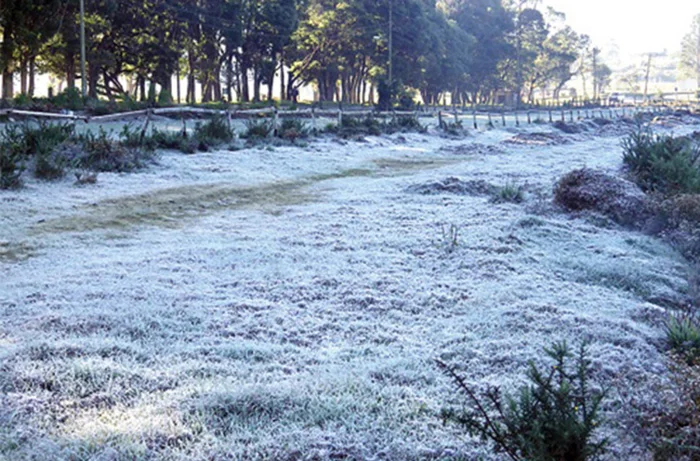
They are on a leisurely uphill crawl,
These shiny, cumbrous city cars,
Beholding in goggle-eyed wonder,
Snow gathering on mountain tops,
Imagining a once-in-a-lifetime photo-op,
But the battered land lying outside,
Gives the bigger picture for the noting eye,
Of wattle-and-daub hut denizens,
Keeping down slowly rising anger,
On being deprived the promised morsel.
By Lynn Ockersz
-

 Business4 days ago
Business4 days agoClimate risks, poverty, and recovery financing in focus at CEPA policy panel
-

 Opinion3 days ago
Opinion3 days agoSri Lanka, the Stars,and statesmen
-

 Business2 days ago
Business2 days agoHayleys Mobility ushering in a new era of premium sustainable mobility
-

 Business2 days ago
Business2 days agoAdvice Lab unveils new 13,000+ sqft office, marking major expansion in financial services BPO to Australia
-

 Business2 days ago
Business2 days agoArpico NextGen Mattress gains recognition for innovation
-

 Business1 day ago
Business1 day agoAltair issues over 100+ title deeds post ownership change
-

 Business1 day ago
Business1 day agoSri Lanka opens first country pavilion at London exhibition
-

 Editorial2 days ago
Editorial2 days agoGovt. provoking TUs


